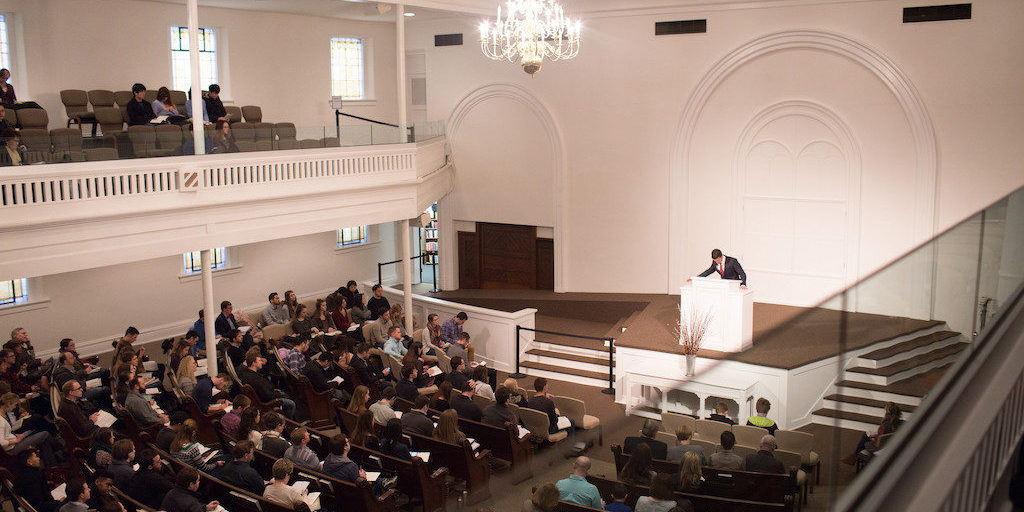
What Does Christ’s Resurrection Mean for Your Local Church?
Our celebration of the Easter season generally centers on the resurrection of Christ from the dead. Having always had authority over all things due to His divine identity, Jesus is declared in the resurrection to be the Lord of the universe (Rom 1:4), the God-man who is given the name that is above all names (Phil 2:9). Easter affords an opportunity to zero in on the person and work of Christ in His substitutionary death and indestructible life.
As we meditate on these doctrines this week, it is imperative that we focus not only on what the resurrection means to me but also on what the resurrection should mean for us. Jesus’ resurrection authority takes a particular institutional shape here on earth. Too often, we evangelicals, who are otherwise clear on what the gospel demands of us as individuals, can neglect God’s purposes for our lives together as God’s people. We tend to forget about the local church.
What follows are three ways that the resurrection, particularly the authority of Christ it proclaims, must impact how we live our lives as Christians together in local churches.
1. Jesus’ resurrection means you should join a local church.
You may not think that local church membership is very important. Maybe you don’t see any link between a core doctrine like the resurrection and something that seems so unnecessary as church membership. But what if our aversion to covenanting together with a visible body of saints is masking a subtle aversion to the authority of the risen Christ? In other words, it is entirely possible to love the Easter story with our lips but to remain at odds with Christ’s kingly authority by not submitting His church in membership. To not be a member of a church is to stand in contradiction to everything we love about Easter. That probably sounds a little too drastic, but it isn’t if Jesus Himself has given authority to the church to speak on His behalf, which is exactly what our risen Lord has done.
Matthew 16 introduces the concept of the “keys of the kingdom.” This hotly debated text begins with Peter’s confession that Jesus is the Christ (Matthew 16:15). Jesus responds by giving the keys of the kingdom—a metaphor of authority—to Peter. But it is not Peter, per se, who receives the keys of the kingdom, the authority to speak on behalf of heaven from earth, but those who like Peter confess rightly the gospel and possess true, saving faith. Matthew 18:15-20 clarifies the matter even further. Jesus uses the same language of keys and authority but identifies the church (ekklesia) as the rightful owners thereof. He does so on the heels of explaining church discipline. Jesus is saying that the church is finally responsible on earth to tell the world who belongs to the family of God and who does not—who is on the “inside” of God’s people and who is on the “outside.” Church membership is God’s way of affirming that we are on the “inside.”[1]
That means it is simply not enough to regularly attend a church. If the local church, and the local church alone, has been delegated the authority to affirm who can rightfully claim to follow Jesus, then we must joyfully submit to Jesus by submitting to a church. If we don’t, we are effectively living the Christian life as free agents, exercising an authority over ourselves that doesn’t properly belong to us.
2. Jesus’ resurrection means your church should live together as a holy people.
Paul says in 1 Corinthians 15 that if Christ has not risen from the dead then we are still in our sins. Thankfully, Jesus has risen and lives today. Christ’s death in the place of His people was deemed a fully sufficient sacrifice and He was subsequently raised for our justification (Rom 4:25).
But the glorious news of the gospel is that Jesus was also raised for our sanctification. Christ’s resurrection means that we are no longer under sin’s penalty and it means that sin’s power over us has been decisively broken. Indeed, we have been united to Christ in His death and in His resurrection (Rom 6:5). Paul’s application of this mind-blowing truth is that we ought to “walk in newness of life” (Rom 6:4). How could it be otherwise? Christians have been given the Holy Spirit through our union with Christ—the same Spirit, Paul reminds us, that also raised Jesus from the dead (Rom 8:11).
Churches are supposed to be made up of such Spirit-filled people who live holy lives together. This was God’s design in giving the new covenant. Jeremiah 31:31-34 speaks of a covenant that God was going to make with His people that was not like the ones that He made with Israel before. God’s old covenant people, Israel, was a mixed entity—some believed, and some did not. With this new covenant people, however, God changed that by securing the final forgiveness of sins and the indwelling of the Spirit for all of God’s people through the blood of Jesus Christ.
The church, God’s new covenant community, now exists as a display of God’s glory. Since God has placed His name on the church, His reputation is tied to its witness. For this reason, thankfully, God has also gifted the church with the Spirit. The risen Christ’s glory is represented by the Spirit-empowered lives of its members. For this reason, this Easter might be well spent thinking about how to cultivate robust cultures of membership and discipline within our churches. Being careful only to take in those as members who give what Baptist theologians have called a “credible profession of faith” protects the holiness of the church. Once our members are inside of the church’s fellowship, a serious emphasis on the resurrection power and authority of Jesus will lead to practicing church discipline. When we think of church discipline, our minds shouldn’t immediately move to excommunication. The discipline of the church encompasses everything the church does as the church to oversee its members’ Christian lives and to encourage them in continued faithfulness to the gospel. A church where it is normal for brothers and sisters to have deep, spiritual relationships is a church that will, by God’s grace, be growing in holiness.
3. Jesus’ resurrection means your church should be obedient to the Great Commission.
The gospel of Matthew ends with Jesus making one of the most breathtaking claims in the New Testament: “All authority in heaven and on earth has been given to me.” Again, Jesus has always had authority as God the Son. But in this unique epoch of redemptive history, the resurrected Son of Man emerges through His redemptive work as the head of a new humanity who is soon to ascend to the right hand of His Father, sit down, and reign there until He comes again.
Given the truth that He possesses all power and authority, Christ then calls His followers to take the gospel to every tribe, tongue, and nation. There appears to be a thread of authority language that we can trace between Matthew 16, 18, and 28. The authority Christ boasts in Matthew 28 has already been invested into the church in 16 and 18. That would mean, therefore, that this Great Commission did not perish with the disciples. No, the Great Commission was given by Christ to the church, His embassies, and will continue until the end of the age (Matt 28:20). Our churches have been commissioned by the King to herald the good news to all peoples to the end that churches would be established around the world, to the praise of His glory.
A few things in the text of Matthew 28:16-20 itself point us to the central role of the local church in global gospel expansion. First, as mentioned above, Jesus’ declaration of His authority here harkens back to His delegation of said authority to the church. Second, and related, Jesus says to go and baptize people into the name of the Triune God. Baptism “into the name” effectively identifies someone as belonging to and representing God. This ordinance’s function would seem to consign it to the local church, a point which the rest of the New Testament will confirm.[2] Finally, the Great Commission includes on-going discipleship to those who come in faith to Jesus Christ. The New Testament everywhere takes for granted that this will take place in the context of a local church (Eph 5:21; Heb 13:17; et al.).[3]
Your church has the privilege to pray for the gospel’s advance and leverage your members and resources for church health all around the globe. Dream of ways to establish gospel-preaching churches, on the authority of the King Jesus, in areas with little or no gospel witness. Jesus’ resurrection has earth-shattering ramifications for individual Christians. But let’s not neglect the wonderful earthly authority the risen Christ has ordained for our good and His glory during this Easter season.
[1] For a more thorough explanation of the interpretation of Matthew 16 and 18, see Jonathan Leeman’s book Don’t Fire Your Church Members (Nashville: B&H Academic, 2016).
[2] See either Bobby Jamieson’s Going Public: Why Baptist is Required For Church Membership (Nashville: B&H Academic, 2015) or his smaller Understanding Baptism (Nashville: B&H Books, 2016) for more on this point.
[3] Mark Dever’s Understanding the Great Commission (Nashville: B&H Books, 2016) is an excellent primer on the local church’s central role in the fulfillment of the Great Commission.

